Enlightened by the BIF/RENAMA Renewable Energy Workshop
On Monday BIF Malawi co-hosted a workshop on renewable energy, inviting participants from public and private sectors (the event page will be up shortly). The primary aim was to facilitate discussion on the development of private sector RET companies in in the country, given the lack of capacity and reach of the national grid and the pressing need for sustainable off-grid energy solutions. The BIF team were fortunate to be able to work with Renew’N’Able, whose Country Director, Martina Kunert, is a one-woman mission to improve knowledge sharing and networking in the sector! Martina was able to identify the right stakeholders to invite to the workshop and also use the forum to introduce her idea to set up “CONREMA” which she hopes will be an umbrella network through which RE projects can share information.

We were also fortunate to be able to collaborate with the World Bank Institute Climate Change group (WBICC) whose workshop on rural electrification was arranged to be at the same venue on the next day. The WBICC have developed a very interesting approach called the “A-B-C model” to help RE businesses to appropriately design their approach to the market by identifying different types of consumer. The WBICC workshop followed on from their earlier workshop in June and combined with the US African Development Foundation competition to award $10,000 prizes to five up and coming RE businesses. The winners were a fascinating mix – including the roofing company Safintra who want to combine RE product sales with their roofing sheets, a small CBO extending their activities into energy solutions and the ambitious Global Electric who hope to convert Likoma Island from its limited, diesel-generator based power supply to a potential wind and solar system.
As someone who is new to the RE sector, outside my experience in working on the MEGA micro-hydro business, I found the positive spirit among participants on both days very encouraging. There is simply a huge opportunity to develop some exciting renewable energy businesses in Malawi. There are also, of course, many hurdles and the major ones I took away from the workshops are listed below:
- Access to finance… this bugbear remains a critical issue (not just in the RE sector!) and needs some serious attention. Donors can plug a few gaps here and there, but ultimately Malawi’s banking sector needs to somehow become more supportive to SMEs.
- Effective networks: the original industry body, REIAMA, has collapsed and what is not clear is whether there is sufficient appetite and commitment among the private sector to revive it or start afresh. It was interesting to note the example of Bio Energy Resources Ltd (BERL) who have grasped the bull by the horns and set up the Bio Fuels Association and the Bio Fuels Network. BERL recognized that these institutions were needed that in order to influence regulation in the industry. If RE businesses want to improve dialogue with government and have a unified “voice” then they need to lead the way for themselves. I am not sure I entirely agree with one piece of feedback we received: “private sector is really not interested in investing in their own future. They think it is someone else's obligation” but it would be reassuring to see some proactivity! In terms of national co-ordination of the industry, the Dept of Energy is committed to building an overarching website and network for energy projects and technical information and will hopefully work hand in hand with CONREMA on this front.
- Education: there were many and varied views about the state of Malawi’s technical abilities in RE technologies. Some felt the lack of training courses was hampering development of the sector, others felt there were some excellent Malawian engineers and technicians but they weren’t able to find good wages here and so were leaving the country. We were lucky to have Mohua Mukherjee from the WB Sustainable Development Dept join us for some of our debates and she also pointed out that education on RE needed to extend past those working directly for RE companies but also to financers, i.e. to help them understand what to look for in an RE business plan, as well as other partners such as distributors and retailers.


Clearly there is much to do and the question I feel I should answer is “what next?” This is what I plan to do in the next few months:
- Conduct analysis for the design of “BIF 2” to decide whether we should pursue work in the RE sector. No doubt I will be speaking more with stakeholders in the industry to gain some deeper insights! This research will be concluded by the end of the year and BIF 2 will commence in January 2014. If we select RE as a sector then we expect to be taking a strategic approach to facilitating growth of the sector working with all stakeholders – it could be very interesting!
- Help Martina to complete work on the website and canvass stakeholder views on the needs / remit of CONREMA.
- Work alongside the WBICC to give support to both the companies that won the competition and others who didn’t but still have good business ideas.
- Continue to “knowledge share” as much as I can between all my RE Malawi contacts!
My question to other participants: What are YOU going to do to both grow your business or organization and help develop the sector as whole?
